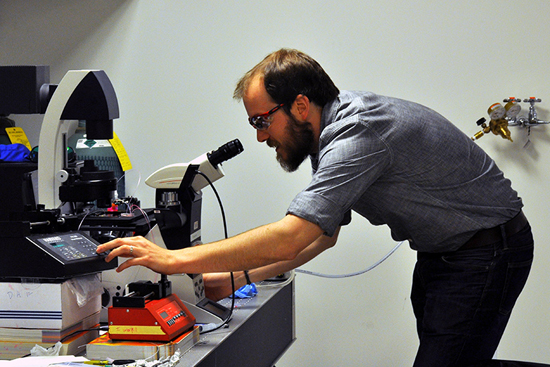NSF CAREER Award Goes to ENG Prof
Thin rod study has potential for smart needles, robotic arms
ENG’s Douglas Holmes will receive $500,000 over the next five years to study the mechanics of how thin rods move through tissue and other soft, fragile media. Photo courtesy of the College of Engineering.
Thin rods and other active materials that can bend and fold on command are essential to the engineering of smart needles, soft robotic arms, and other flexible devices that can improve care in fields such as medicine, for instance.
Douglas Holmes, a College of Engineering assistant professor of mechanical engineering, has received a National Science Foundation Faculty Early Career Development (CAREER) award to study the mechanics of how thin rods move through soft and fragile media, such as tissue and granular materials. Knowledge gained from the study could enable the construction of advanced autonomous structures capable of navigating around obstacles in such media. Holmes will receive $500,000 from the NSF over the next five years.
CAREER awards are given in recognition of outstanding research and teaching capabilities, and they support high-impact projects that combine research and educational goals.
“The results of this award will help predict the deformation and buckling of slender structures within complex media, while providing a general framework for designing structures that can actively and controllably bend within soft and fragile matter,” says Holmes.
Holmes will use part of the funding to develop open online course content designed to improve the public’s understanding of mechanical engineering.
To date, 38 ENG faculty members have received an NSF CAREER award, as have numerous other BU faculty members.
Author, Mark Dwortzan can be reached at dwortzan@bu.edu.
A version of this story originally appeared on Bostonia.
